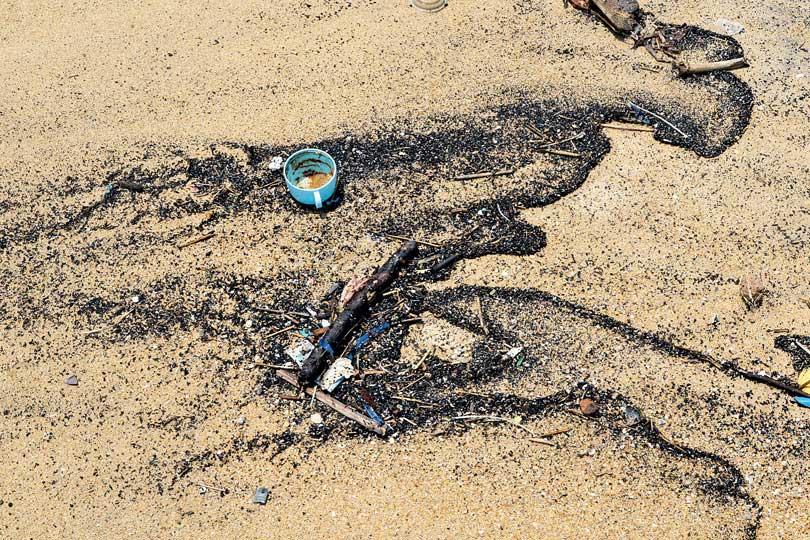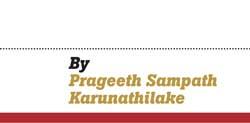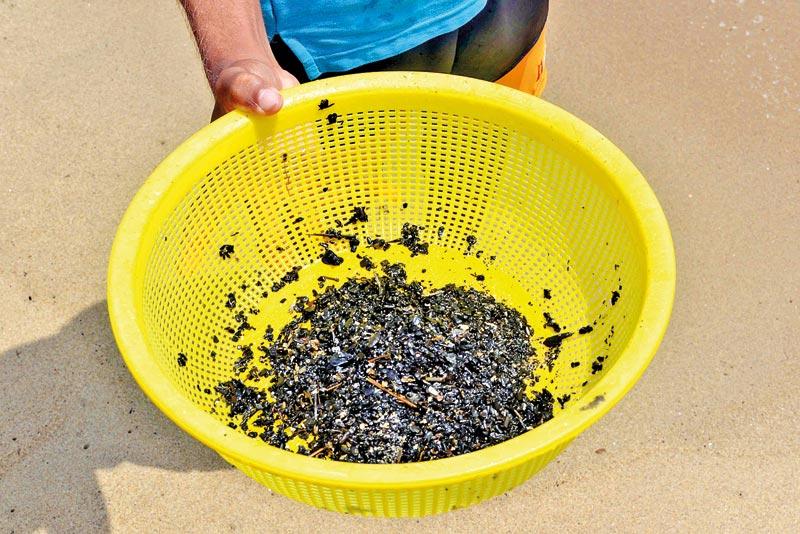01 Jun 2023 - {{hitsCtrl.values.hits}}

Burnt plastic pellets gathered on the beach - Pics by Samantha Perera
The marine body and the fishing community are continuing to suffer due to a new leakage which is suspected to be oil from the vessel
Fishermen who went fishing from Wattala area have complained that there is an unbearable stench in the leaked ‘oily’ substance
The fishing community in oil affected areas maintain that in 10 years time there won’t be any fish in these waters

As Sri Lanka marks the second year of the X-Press Pearl inferno, the Indian Ocean’s worst ever marine ecological disaster witnessed in Sri Lankan history, the marine body and the fishing community are continuing to suffer due to a new leakage which is suspected to be oil from the vessel. The fishermen who went fishing from Wattala area have complained that there is an unbearable stench in the leaked ‘oily’ substance.
The fishermen suspect that the substance could be oil or any other harmful chemical that had been released with the cutting of the 186 metres or 610-foot hulk into two sections by the China-based Shanghai Salvage company, which had been hired to undertake the salvage operation.
‘The substance that is spilled and floating looks like oil. This is from the sunken ship,” P. Lal Nissanka, President of the Sadasarana Village Fisheries Organisation in Hendala and the United Fisheries Organisation Pamunugama said.
|
P. Lal Nissanka |
|
Mepa workers collect plastic pellets washed with the waves |
|
Plastic pellets and other debris
|
“Not only me there is a large number of fishermen who has witnessed this. There is an unbearable stench emanating from this substance. It was about 9 km from the beach that the burnt ship sank. The water is black in colour and because of the ongoing monsoon the water doesn’t reach the land, but goes to the deeper sea,” Lal Nissanka said.
He said that in a few days this water with a layer of oil would reach the beaches in Chilaw and surrounding areas.
“In 10 years time to come there won’t be any fish in these areas,” Lal lamented.
Two years ago Singapore-registered Super Eco 2700–class container ship operated by X-Press Feeders caught fire on May 20, 2021 off the coast of Colombo. It was in flames by May 27 and after burning for 12 days it sank on June 2. This happened while it was being towed towards deeper waters. Salvage operations to remove the wreck began in November 2021 with plans to complete it by April 2023. However the salvage operation was interrupted during the southwest monsoon; which is from late April to November 2022.
According to X-Press Pearl Maritime Disaster Sri Lanka – Report of the UN Environmental Advisory Mission- released in July 2021- the X-Press Pearl incident is the worst maritime disaster to have struck Sri Lanka. “It has had a significant impact on Sri Lanka’s sensitive coastal environment, local communities and the economy. Moreover, the event continues to unfold, and its active pollution generation phase will only come to a closure with the elimination of the risks from the wreck and containers lost at sea,” the UN Environmental Programme report warned.
“Along with uncertainties of cascading environmental damage, the incident’s complexity stems from the range of pollutants involved – oil, hazardous chemicals and plastics – and the lack of clarity regarding the nature and status of a substantial part of the vessel’s cargo. Moreover, the growing geographic extent of the plastic spill – the largest on record – is expected to have transboundary impacts further compounding the problem,” the report added while stating that there are two immediate risks from the incident that need to be eliminated immediately: 1. a sudden major spill of the fuel oil aboard the ship; and 2. Pollution and navigational hazards from the wreck and lost containers.
Extending the warning well ahead two year ago, the UN Report noted “Proactive and vigilant surveillance are required to mitigate these risks. With the development of offshore and shoreline clean-up plans, as well as the deployment of response equipment, key factors are now relatively well pre-positioned to deal with a possible oil spill. Action to contain and recover the limited but continuous release of oil from the wreck should be taken as soon as conditions allow.”
The UNEP advised that “planning needs to be initiated to remove the wreck, lost containers and debris as a matter of priority. A detailed roadmap for this major decommissioning project needs to be developed immediately in a consultative and transparent manner, and independently from current concerns over monsoon related weather challenges. Government sanctioned oversight is imperative to ensure accountability for the satisfactory conduct of the work and instilling public confidence in the wreck and debris recovery process,”.
|
J. Anton a fisherman from Wattala |
Fishermen who were fishing in the sea where X-Press Peal sank complain that there are no fish in the area. “There are no fish in the sea off Hendala and Wattala where debris of ship is visible. On May 29 I went out to sea and I could catch only one and half kilograms of Indian Mackerel (Kumbala), and I earned only around Rs. 850. Earlier we made a catch of about 50 to 60 kg or some time the same fish. We also used to catch fish like Salaya and Atawalla, but you don’t find them anymore,” J. Anton a fisherman from Wattala said. “There were times when we used to make a catch weighing around 100 to 200 kg and we used to bring whatever we could to the shore and shared with others who went out to sea,” Anton said reminiscing the past that had now been reduced to memory or fuelled wishful thinking.
He claimed that the shortage of fish that leads to sever price hikes in fish market is mainly due to the disaster.
“This whole change started nearly two years ago. We don’t have fish because of the X-Press Pearl disaster and spilling of oil and other chemical substances. We still get burnt plastic pallets that wash ashore. Not only has the sea the entire beach stretch been destroyed,” he complained.
Visiting the beaches in the area, this newspaper witnessed what Anton stated as nearly 30 to 50 kg of burnt plastic pallets and other debris had been collected daily by workers deployed by Marine Environment Protection Authority (MEPA). Two years after the disaster plastic palettes are continuing to wash ashore to beaches in Wattala to Negombo. A collector of debris is paid Rs. 3000 per day. It is not only the sea, but the entire environment has been damaged by the ship disaster, Antony said.

Plastic pellets collected
Opposition MP Ajith Mannapperuma on Sunday made a visit to the area where the ship sank and said that either spill of oil or any other chemical starts from the very place where the ship sank.
“According to our observations, it could be a layer of oil or any other chemical substance. It is clear that this substance emerged from the containers or from the ship itself. We also observed that a dead turtle and some fish were floating in the same area. And the water in the area was black in colour,” MP Mannaperuma said. He said that salvage operation had been suspended.
“What was removed was the part that was not affected by chemicals. Containers with hazardous substances are still lying under the water,’ he said. He further charged that when removing the part of the ship the pumps that were disconnected had not being properly sealed.
“It could be oil or any other chemical substance that is being released to the water,” MP said while demanding an urgent investigation as to what exactly had taken place. He said that not only the sea and beaches but fish resource also could be destroyed creating lost employment opportunities for fishermen.
|
“There are containers in the sea and it looks like these substances emerged from containers. They are not coming from anywhere else, but from containers. We have sent the samples for laboratory tests” - Indika Wijeratne MEPA’s District Marine Environmental Officer |
“According to observations the questionable substance emerged from containers,” Indika Wijeratne, MEPA’s District Marine Environmental Officer said. He said that water samples had been collected from selected places in the area and had been dispatched for testing.
“’I observed a layer of oily substance from the area. We cannot yet tell whether it is oil or any other chemical substance,” Wijeratne said. “There are containers in the sea and it looks like these substances emerged from containers. They are not coming from anywhere else, but from containers. We have sent the samples for laboratory tests,” Wijeratne said.
He said that due to the monsoon the burnt pallets are being washed ashore and workers have been deployed to collect them.
“The valves and pipes that were cut during the salvage operation hadn’t been properly sealed. There could be a possibility of oil spills, but not in a major way. But if it is a chemical substance that is being released in a small way it could be dangerous,” MEPA General Manger Jagath Gunasekra said. He requested from the public to inform MEPA if they observe any damage to the environment or to their personal belongings like fishing nets so that they too could be included when damages are accounted for. He also said that the Wildlife Department and the National Aquatic Resources Research and Development Authority (NARA) are in constant observation on any damage to the sea and marine bodies. Gunawardena said that reasons for the shortage of fish could be obtained from the Fisheries Ministry.
The Daily Mirror tried to contact the Fisheries Ministry with regard to shortages of catch when finishing. By 4.10 pm there was no one available for comment. The security officer on duty said that there was no one to answer the phone as all employees were off for the day. However the telephone was directed to an Additional Secretary who did not want divulge his identity. “Don’t ask such serious questions. We cannot answer them,” he said adding that whether the shortage of fish was due to X-Press Pearl disaster could only be found out after an investigation.
Speaking about observations made by the Sri Lanka Navy, the media spokesman denied any oil spill from the area closer to the X-Press Pearl ship. “There are no oil spills form the ship. This had been confirmed by MEPA and NARA,” SLN media spokesman Captain Gayan Wickramasuriya said. He also said that an examination was done near the area closer to the ship wreck but an oil spill could not be found. “This could be oil that is released from the fishing boats that leave from Modara area.
|
“There are no oil spills form the ship. This had been confirmed by MEPA and NARA,” SLN media spokesman Captain Gayan Wickramasuriya |
 Renowned environmental activist Dr. Ajantha Perera warned that if there is oil or a chemical spill from the disastrous X-Press Pearl ship it could be a extremely dangerous to the environment. “There are no fishing resources now. There is no oxygen for fish and other marine animals to live. There is production of food from this area. This is a dead sea and it is of no use now,” Dr. Perera charged. She said that no one knows what is spilling is oil or oil mixed chemical substances. “There is a large number of containers with hazardous chemical substances and if those substances are released the fish in the area will be affected and those who consume these fish too would be affected,” she warned.
Renowned environmental activist Dr. Ajantha Perera warned that if there is oil or a chemical spill from the disastrous X-Press Pearl ship it could be a extremely dangerous to the environment. “There are no fishing resources now. There is no oxygen for fish and other marine animals to live. There is production of food from this area. This is a dead sea and it is of no use now,” Dr. Perera charged. She said that no one knows what is spilling is oil or oil mixed chemical substances. “There is a large number of containers with hazardous chemical substances and if those substances are released the fish in the area will be affected and those who consume these fish too would be affected,” she warned.
|
The white oil patch gathered near the burnt vessel
|
She cautioned that people should refrain from eating fish from the area until a proper investigation is conducted. ‘This is an extremely serious situation. If this continues in the next five to ten years time there could be effects of hazardous chemical substances. There could be a massive increase of cancer patients and a large number of people affected with unidentified diseases. There wouldn’t be anyone to take responsibly for this desaster,” she said.
Dr. Ajantha’s warning also directs to the UNEP reports which suggested “environmental assessment of the incident needs to focus on pollution ‘hot spots’; namely the area of the wreck and impacted shoreline sites. The investigation strategy should be directed at resolving several key questions with significant socio-economic implications and to allay public concerns, notably: 1. Is the fish inside/outside the designated ‘no fishing area’ safe to eat? 2. When should the moratorium on fishing be lifted? 3.Is the reported spike in turtle and marine mammal deaths linked to the incident?
23 Nov 2024 1 hours ago
23 Nov 2024 2 hours ago
23 Nov 2024 3 hours ago
23 Nov 2024 4 hours ago
23 Nov 2024 4 hours ago